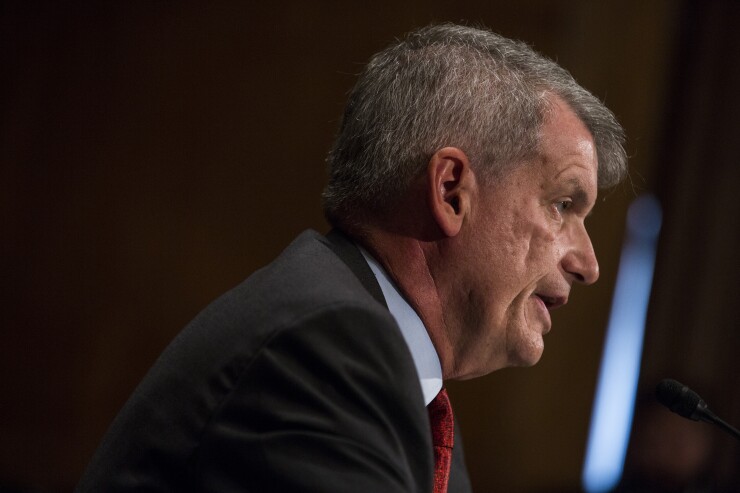Receiving Wide Coverage ...
Settled: Royal Bank of Scotland agreed to pay $4.9 billion to settle U.S. Department of Justice charges relating to mortgage-backed securities packaged and sold before the 2008 financial crisis. The agreement, which was for an amount less than what some analysts had feared, clears the way for the British government to sell more of its shares in the bank, which was taken over during the crisis. CEO Ross McEwan called the deal “a milestone moment for the bank.” Wall Street Journal, Financial Times, American Banker
Wall Street Journal
More problems: Another error. Wells Fargo admitted it improperly pocketed nearly $50,000 in fee rebates that should have gone to a Tennessee public pension fund. The Chattanooga Fire & Police Pension Fund said its plans to fire the bank as trustee and filed a whistleblower complaint with the Securities and Exchange Commission and the Commodity Futures Trading Commission. It also filed a complaint with a Tennessee state court in order to get a full accounting of the matter.
The pension fund said it has been “investigating potential fraud and overcharging by Wells” for the past nine months. Wells blamed the problem on “a system set-up error” which it owned up to late last month.
Separately, the bank must pay $97 million to home mortgage consultants and private mortgage bankers in California for various wage and hour labor violations, a judge ruled.
On the hot seat: Several senior female executives at Visa are scheduled to meet with CEO Alfred Kelly Thursday to discuss the lack of promotion opportunities at the payments giant. “Some of them are expected to tell Mr. Kelly that Visa fosters a ‘bro’ culture that excludes women,” the paper says. “Visa in recent months has grappled with several issues related to the treatment of women.”
Their turn: The Senate Banking Committee is scheduled to meet next Tuesday to consider Richard Clarida’s nomination to become the Federal Reserve’s vice chairman and Michelle Bowman’s selection to the Fed’s seven-member board of governors. Another Trump nominee, Marvin Goodfriend, a professor at Carnegie Mellon University and a former monetary policy adviser to the Federal Reserve Bank of Richmond, is still pending.
Moving forward: MetLife has reached a deal to assume about $6 billion of pension payments to 41,000 retirees and beneficiaries of FedEx, one of the largest such risk-transfer deals over the past five years. The agreement is viewed as “a vote of confidence” in the insurance company following the recent disclosure that it failed to pay benefits to more than 13,000 pensioners, which caused the company to bolster its reserves by $510 million.
Financial Times
Predicting the future: While it is still not in the near future, the paper considers what a cashless society will look like.
New York Times
Shattered: Eric Schneiderman’s legacy “is in tatters,” following his resignation in disgrace. While hailing his successes, the paper notes critics claim he "tried to do too much and [that] spread him thin."
Washington Post
Merging: The Consumer Financial Protection Bureau is folding its student loan office into its office of financial education, “a consolidation that some fear will limit its ability to stand up for student loan borrowers,” the paper says. “Advocacy groups, liberal lawmakers and former employees at the bureau are interpreting the news as an intentional move to dismantle the only unit in the federal government solely dedicated to protecting student loan borrowers from predatory actors in the financial sector.”
Ready to bank: American Samoa is “putting the finishing touches on the first new U.S. public bank in almost a century,” the paper reports. The remote island territory, which has had only minimal private banking services for the past five years, “found inspiration in early frontiersman and prairie progressives who had likewise found themselves on the margins of the American economy. The development is being closely watched by other isolated regions hoping to kick-start economic renewal — and by the legal marijuana industry whose operators have struggled to enter the federal banking system.”
American Banker reported last week that the Fed granted permission for the territorial bank to access the U.S. payments system nearly two years after it first applied.
Quotable
“America is facing an ongoing student debt crisis, with outstanding student debt surpassing $1.5 trillion and over 8 million borrowers in default on their student loans. Closing the office for students is like shuttering the fire department in the middle of a three-alarm fire.” — Alexis Goldstein, senior policy analyst at Americans for Financial Reform, on the CFPB’s plan to consolidate its student loan unit into another section of the bureau.






